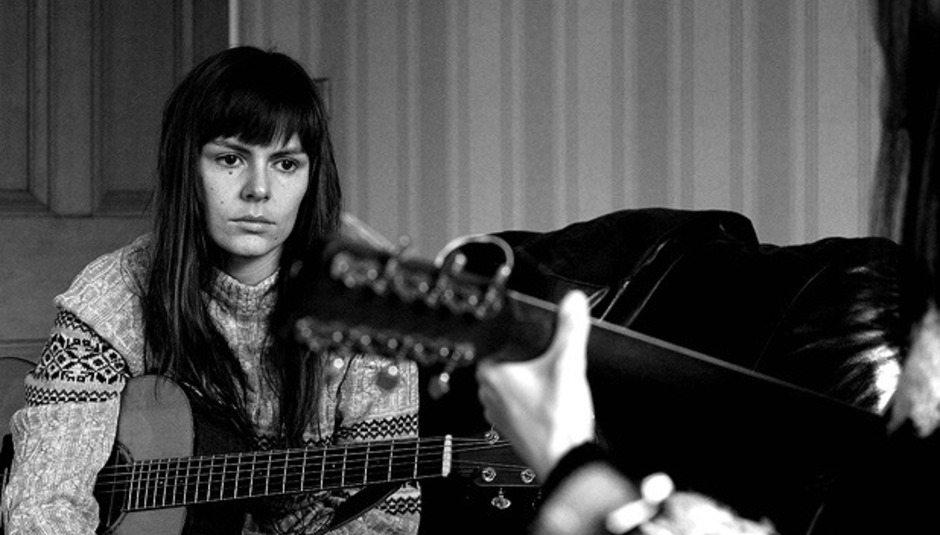The Fruit Tree Foundation is a new independent project in Scotland led by musicians Rod Jones (Idlewild) and Emma Pollock (solo artist and ex-Delgado). They formed a group in February 2010 for 5 days to record a charity album for The Mental Health Foundation, comprising of the best in Scottish talent: Scott Hutchison (Frightened Rabbit – and who helped with this interview), James Graham (Twilight Sad), Jill O’Sullivan (Sparrow and the Workshop), Karine Polwart, Jenny Reeve, Alasdair Roberts and James Yorkston.
This is what they had to say about the project...

Where did the initial thought come from? It feels a very personal record and like one with an interesting back-story?
EP: I had been working with The Scottish Mental Health Arts & Film Festival (SMHAFF) over the previous few years collating the live music events with Rod Jones and after doing that a while we thought it was time to do something a bit different and which could travel further. Rod came up with the idea of getting a bunch of Scottish songwriters into a house to write some original material and so we started putting our ideas together mid 2009, ready to go into the house in early 2010.
RJ: I guess the idea really came quite naturally really? While the gigs under the Music like a vitamin banner were great and brought a lot of attention to the foundation and mental health wellbeing I really felt that this was time constrained and that, after the festival, the discussion ended until the next year. I really wanted to try and do something that would last all year round or possibly further. Doing a record seemed the natural progression. With the constraints of song ownership and publishing I realised that the best way to do this would be for the foundation to commission new music so that we could own and distribute it in a way that best served the festival and the mental health wellbeing cause.
A loose theme of childhood arose as I really felt that this linked in with, in my opinion, the need for mental health education. I feel that we spend so much time in schools on sex education and physical education but little on how to deal with our emotions.
Did any of the artists on the record already have connections with the Mental Health charities the record is partnered with?
RJ: A good few of the collaborators had played our Music like a vitamin gigs over the previous two years and also several had been quite outspoken and open about their own experiences with mental health. Its probably best if I leave it for them to tell their own stories though.
EP: They were great gigs, with huge attendance as we always kept the ticket prices so low.
RJ: Personally, other than the festival itself I had worked alongside Breathing Space, which I feel provides an invaluable advice and counselling service over the phone for Scottish males.
How did you ensure that the standard of the record remained so high? It feels like you could have done the easy thing, released a few covers and people would still have bought it...
EP: Funnily enough the first idea was to do covers, but the slightly tricky legalities behind that encouraged us to look at other ideas. It was a much more unique approach to have new original material written for this album and one that had much more personal investment involved, particularly given that we wanted the writers to perhaps take on board a very loose theme when writing lyrics.
The standard of the songs is remarkably high and I wasn't necessarily expecting that. I knew it would be good, as a result of the people involved, but to have a record like this fit together so well and have so much diversity is a fantastic achievement and one that shows how much everyone involved cared about it.
RJ: We could never have imagined they would turn out to make such a complete, coherent and, I think, poignant album. Having new and specially commissioned music has such a stronger and more powerful message I feel.
EP: It's a great thing as a songwriter to be pushed to do something a bit different, be unsure about it and then discover later on that you love it.
The album is made up purely of collaborations but many of the acts involved are solo artists. How did they find it working together in this way?
RJ: Pretty much all of us were nervous about the writing. Whether it was down to admiration of the other writers or just not being used to writing with other people, there was a real uncertainty and feeling of a big responsibility to deliver for everyone but this maybe added to the process. A bit of tension and pressure gave the songs an edge.
EP: Certainly from my own point of view as a former band member turned solo artist, I've really enjoyed the opportunity to work with other people and see what they can make you come up with and vice versa. A solo artist can take advantage of a situation like that a little more easily than a band member can I think as there is that freedom to write on your own or with someone of your choosing.
Was the idea of First Edition being a collaborative record important to the core conceit from the outset?
EP: Yes I think it was. We could have asked the same writers to write something new on their own I suppose but that wouldn't have been half as much fun as pulling everyone together in the house for 5 days and then telling them who they were going to write with. I know I was terrified when I arrived.
RJ: The idea of bringing together people to work together and write seemed the most obvious to me. I thing writing together is almost like taking over your feelings or problems with someone. Writing is so personal and you tend to bear all so do do this with someone else was quite a therapeutic and relevant experience. Certainly for me.
Last year you launched the record with a series of gigs I saw. How were those and could you see them ever happening again?
RJ: The gigs were really great actually. It was probably the one thing I was most worried about from the offset, even more so after hearing the completed record as it had a lot to live up to live. I think the nerves and tension combined with the camaraderie that had been built through the process of writing and recording made for really special couple of evenings.
EP: Again this was another unknown element of the whole idea... write the songs, record the songs then play the songs live for 2 gigs only, while the album was temporarily made available. It was nerve wracking during the lead up to the shows - Rod and I had a hard time trying to explain to everyone what exactly the gigs were about. 9 different songwriters, playing under the new banner of 'Fruit Tree Foundation' a new body formed to raise awareness of mental health with music projects, and fourteen brand new songs to be played, only on those nights. There's not enough room in a brochure to get all that info across. The gigs were packed however and we sold loads of records on those 2 nights. Quite an experience trying to play the songs as well for the first time live...
RJ: As to whether they will be repeated remains to be seen. A tough feat to pull off but I would ever like to write it off...
Does the lyrical content directly relate to the issue of Mental Health? I presumed so from the bits and pieces I can glean from the lyrics and the Parental Advisory sticker on it...
EP: This is a difficult one for me to answer but I guess that subtly, yes, the lyrical content of these songs does acknowledge the charity and movement we are promoting. It can of course be argued that the writing of any form of lyrical expression is a positive mental action and in itself promotes a positive mental attitude.
None of the songwriters claim to be telling anyone how to solve problems or live life, but the simple act of putting this record together in the context of the SMHAFF we hope will encourage more discussion and awareness of the festival and the charity it promotes.
RJ: We knew you cannot censor or direct songwriting so we merely gave a brief overview at the start talking about why we were involved and what the loose themes or inspirations were and then let people write what ever came naturally. To be honest almost all songs can be taken in a number of ways and mental health is something so relevant to most art forms.
SH: I think that when it came down to the lyrics, we all tried not to be too stultified by the theme. However, the issue is quite a wide net so perhaps it's inevitable that the songs relate in some way to the theme of mental health. I think it's also inevitable that, if you put a bunch of Scottish songwriters together, there will be a certain amount of choice language...
In hindsight, do you have a favourite track or two on the record a few months down the line?
RJ: I would hate to say. There were some that were great fun to write, some to record and some to play live but the whole album is just so consistently strong it is hard to pick favourites?
EP: It is true that you only know a record once you've been away from it and come back to it. I remember hearing a lot of the songs after the first day's writing and thinking there's a lot of great stuff here. Then the songs took a further leap forward once we got a band together and started to put arrangements in place. Once the record was done I was quickly leaving for holiday and took it with me. I remember listening to it a few weeks later and it dawning on me just how strong it was. You can just never tell while making the thing. I do have favourites yes, but like all the best records they change from month to month until I realise I've been round the whole album.
SH: I really like Rod and Jill's song. It's a gentle wee tune about a creaky old tree, with some gorgeous harmonies. I'm also a fan of Karine Polwart and James Graham's song. Were it not for this project, it's unlikely that these two would have ever worked together, which is one of the great things about the record.
Do you think there'll be a follow up LP in the future or any side projects borne out of it?
EP: I'm really not sure. I dare say some new collaborations might come out of it in the future. I've already recorded another track with Alasdair Roberts recently which I really enjoyed as I didn't get to write with Alasdair in the house really as we all left earlier than planned when the snow came down heavily one night. I'll get around the other seven some time later I reckon...
RJ: Actually I'm just launching a new "branch", pardon the pun, of the Fruit Tree involving high profile artists mentoring newer less known artists. There will be a launch gig following a 6 track initial EP of the first 3 sessions to come out with the mental health festival this October. The project will hopefully go into a year long project with a new pairing each month, starting January 2012.
EP: I'm looking forward to getting into that later this year. As far as another FTF album goes, there is some chat already, and knowing Rod I reckon I better keep my calendar free!
RJ: I think that we will definitely make another Fruit Tree record, possibly next year. The initial plan was to go with UK wide artists in year 2 with international in year 3 but given the success of the record and global interest already we may leap straight to international. Listen out for your phone Mr. Springsteen...
Many thanks to Emma, Rod and Scott for their time and Alun at Chemikal Underground for all his help.
You can download two free tracks from the project here






















